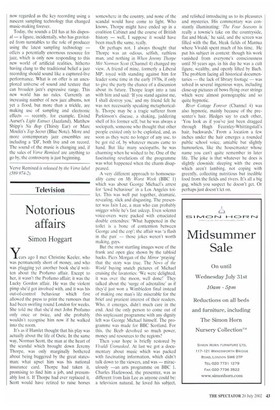Notorious affairs
Simon Hoggart
ears ago I met Christine Keeler, who was permanently short of money, and who was plugging yet another book she'd written about the Profumo affair. Except to her, it wasn't the Profumo affair; it was the Lucky Gordon affair. He was the violent pimp she'd got involved with, and it was his out-of-control behaviour which first allowed the press to print the rumours that had been swirling round London for weeks. She told me that she'd met John Profumo only once or twice, and she probably wouldn't recognise him now if he walked into the room.
It's as if Hamlet thought that his play was actually about the life of Osric. In the same way, Norman Scott, the man at the heart of the scandal which brought down Jeremy Thorpe, was only marginally bothered about being buggered by the great statesman: what upset him was his national insurance card. Thorpe had taken it, promising to find him a job, and presumably lost it. If Thorpe had ever replaced it. Scott would have retired to raise horses somewhere in the country, and none of the scandal would have come to light. Who knows, Thorpe might have ended up in a coalition Cabinet and the course of British history — well, I suppose it would have been much the same, really.
Or perhaps not. I always thought that Thorpe was an odious, selfish, ruthless man, and nothing in When Jeremy Thorpe Met Norman Scott (Channel 4) changed my view. A friend of mine, formerly a Liberal MP, toyed with standing against him for leader some time in the early 1970s, if only to give the party the chance of a discussion about its future. Thorpe leapt into a taxi with him and said: 'If you stand against me, shall destroy you,' and my friend felt he was not necessarily speaking metaphorically. Thorpe may be a tragic sufferer from Parkinson's disease, a shaking, juddering shell of his former self, but he was always a sociopath, someone who thought that other people existed only to be exploited, and, as soon as they were no longer of any use, to be got rid of, by whatever means came to hand. But like many sociopaths, he was charming when he wished to be. One of the fascinating revelations of the programme was what happened when the charm disappeared.
A very different approach to homosexuality came on My Worst Week (BBC 1) which was about George Michael's arrest for 'lewd behaviour' in a Los Angeles toilet. This was well put together, dramatic, revealing, slick and disgusting. The presenter was lain Lee, a man who can probably snigger while he's fast asleep. Even solemn voice-overs were packed with emaciated double entendres: 'What happened in the toilet is a bone of contention between George and the cop'; the affair was 'a flash in the pan' — those jokes weren't worth making, guys.
But the most startling images were of the frank and open glee shown by the tabloid hacks. Piers Morgan of the Mirror 'praying' that the story was true. The News of the World buying snatch pictures of Michael cruising the lavatories: 'We were delighted, it was over the moon, well done!' They talked about the 'surge of adrenaline' as if they'd just won a Wimbledon final instead of making one man's life miserable for the brief and prurient interest of their readers. Who, it emerges, didn't much care in the end. And the only person to come out of this unpleasant programme with any dignity left was George Michael himself. The programme was made for BBC Scotland. For this. the Beeb devolved so much power. money and resources to the regions?
Then your hope is briefly restored by Vivaldi Unmasked. At last we got a documentary about music which was packed with fascinating information, which didn't talk down to the viewers, and was — miraculously —an arts programme on BBC 1. Charles Hazlewood, the presenter, was as different from lain Lee as anyone could be: a television natural, he loved his subject.
and relished introducing us to its pleasures and mysteries. His commentary was constantly illuminating: 'The Four Seasons is really a townie's take on the countryside, flat and bleak,' he said, and the screen was filled with the flat, bleak fields of Mantua where Vivaldi spent much of his time. He put his subject in context: though his work vanished from everyone's consciousness until 50 years ago, in his day he was a cult figure, wealthy, and openly lifted by Bach. The problem facing all historical documentaries — the lack of library footage — was solved in several ingenious ways, including close-up pictures of bows flying over strings which were almost pornographic and so quite hypnotic.
River Cottage Forever (Channel 4) was also hypnotic, mainly because of the presenter's hair. Hedges say to each other, 'You look as if you've just been dragged through Hugh Fearnley-Whittingstall's hair, backwards.' From a location a few inches under the hair emerges a rounded public school voice, amiable but slightly humourless, like the housemaster whose name you can't quite remember in later life. The joke is that whatever he does is slightly clownish: sleeping with the ewes which aren't lambing, not coping with greenfly, collecting nutritious but inedible food from the fields and rivers. It's all a big gag, which you suspect he doesn't get. Or perhaps just doesn't let on.


























































 Previous page
Previous page